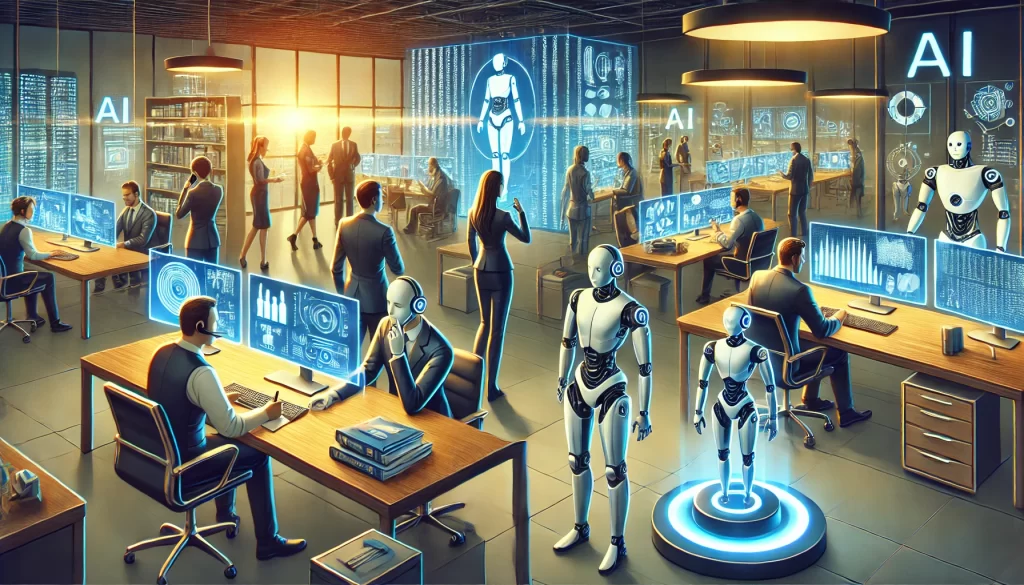CHATGPT
Special to The Leader

Graphic by CHATGBT | Special to The Leader
In an ironic twist to the global narrative about artificial intelligence (AI) taking human jobs, a new trend is emerging: people are taking jobs initially intended for AI.
With rising distrust in technology, companies and consumers alike are increasingly favoring the “human touch” in roles that were once the exclusive domain of AI models like ChatGPT. The result is a surprising reversal of roles in fields ranging from customer service to content generation, rekindling debates over the role of AI in society and what future employment could look like.
Artificial intelligence’s rapid adoption in customer service, marketing, content creation and data analytics was expected to ease workflows, boost productivity and even reduce costs. AI language models like ChatGPT quickly became the go-to for everything from answering customer queries to writing reports.
However, as AI’s influence grew, so did skepticism among users, fueled by concerns over privacy, accuracy and the ethical dimensions of relying on machines to shape human-centered content.
In 2024, a series of surveys indicated that customers felt more comfortable interacting with human agents rather than AI for critical or personal matters, a sentiment that led companies to reconsider their AI-first policies.
A recent report from the consultancy firm McKinsey & Company indicated that 57% of customers prefer human support in banking, healthcare and e-commerce settings. The shift, McKinsey notes, is particularly notable among older adults, who tend to distrust AI-powered services more than their younger counterparts.
This trend has sparked a resurgence in hiring for jobs previously assigned to AI, especially for handling customer complaints, inquiries and social media.
“Many people feel that AI lacks empathy and nuance, which are crucial in complex situations,” says Sarah Lin, a consultant specializing in consumer experience. “AI is great for fast, basic responses, but when issues become layered or emotional, people feel underserved by a chatbot, no matter how advanced it is.”
Customer service isn’t the only area where humans are making a comeback. Content creation roles initially earmarked for AI are now in demand for human writers, editors and even illustrators.
Concerns over authenticity and creativity have led companies to revert to human talent, especially in roles that require strong personal voices and a unique creative perspective. Brands across industries have noticed that audiences increasingly demand content that feels “real,” a sentiment that is often hard to replicate through AI-generated text or images.
For instance, in a recent marketing campaign by a major retail brand, human writers and graphic designers replaced an AI-driven team, specifically to achieve a more “human-centered” tone. The result, according to the company, was an uptick in customer engagement and positive feedback.
“People know when something feels authentic versus generated,” says Mark Reeves, a senior manager at the company. “AI can still play a role in supporting our creatives, but the final touch — the human element — has proven invaluable.”
One of the driving forces behind the transition back to human roles is ethical concerns around AI’s influence in the workplace. Labor advocates argue that overreliance on AI can lead to significant job displacement and the pendulum swing back toward human labor could serve as a balancing measure.
Moreover, ongoing privacy concerns have prompted both companies and consumers to scrutinize the types of data AI systems use and how that data might affect consumers.
In response, some companies are committing to an “AI-augmented” rather than “AI-driven” model, where AI serves as a tool rather than a replacement for human employees. By blending AI support with human oversight, businesses aim to balance the efficiency and consistency of AI with the empathy and critical thinking that only human beings provide. This mixed approach is expected to become more common in sectors like education, healthcare and social media management, where human oversight is often essential.
“We have seen the value AI can bring to repetitive tasks, but not at the cost of eliminating human jobs,” says Angela Cortez, a labor rights advocate. “If we continue down the path of total AI reliance, we risk losing essential skills and weakening our labor force. A collaborative approach is far more sustainable.”
While the human takeover of AI-created jobs is noticeable now, experts are uncertain about its longevity. For many companies, human workers still represent a higher cost compared to their AI counterparts, who can perform many tasks 24/7 without benefits or salary increases.
As AI models continue to improve, they may eventually address many of the shortcomings that led to the human resurgence, potentially re-claiming the jobs they once held.
Moreover, as AI ethics improve and models become more nuanced, public perception may shift once again, favoring automated solutions for their efficiency and adaptability.
For now, however, the trend of human workers stepping into AI-designed roles reflects a broader societal reckoning with the implications of automation, suggesting that people are not ready to fully surrender the workplace to machines.
As AI and humans continue their complex, intertwined dance, the evolving job market serves as a reminder that progress doesn’t always move in a straight line. Whether the pendulum eventually swings back in AI’s favor, or whether humans reclaim their place at the forefront of these roles, the push and pull between technology and humanity is far from over.
This article was written entirely by ChatGPT and is meant to be satire. The Leader does not support AI replacing real, human journalists. Additionally, the graphic for this article was generated by ChatGPT, and The Leader does not support AI replacing real, human graphic artists.
